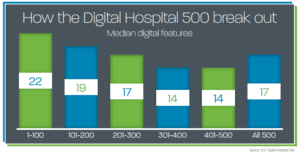For the most forward-thinking hospitals, digital increasingly is a way of conducting business—and treating patients, according to research from Internet Health Management’s 2017 Digital Hospital 500
While consumer-facing web technology is relatively new to healthcare—and many hospitals—some hospitals have led the way into the digital future.
These are the institutions featured in the Internet Health Management Digital Hospital 500, which for the first time ranks hospitals on their digital and mobile healthcare prowess. That ranking is based on an assessment of each hospital’s patient-focused web features and mobile services, as well as such other metrics as online traffic and social media activity.
For the most forward-thinking hospitals, digital increasingly is a way of conducting business—and treating patients. Top-ranked Cleveland Clinic, for example, scheduled nearly 71,500 online doctor visits last year. UPMC Presbyterian (No. 2 in the rankings) in November launched its Anywhere Care Android and Apple app, which lets patients in Pennsylvania sign up for and conduct digital doctor visits with a UPMC provider for a $49 fee. So far more than 7,500 UPMC patients have downloaded the app and conducted more than 2,000 digital doctor visits.
There are about three dozen features and functions that hospitals have incorporated so far into their digital and mobile healthcare programs. They range from enabling patients to access electronic health information, find doctors and pay bills to more sophisticated tools for rating and reviewing providers online or accessing electronic physician notes about them. All hospitals ranked in the Digital Hospital 500 offer their consumers and patients at least some digital connectivity, most typically through an information portal that let patients view at least a part of their medical record, and e-mail their doctor or another clinician. For example, 491 institutions (98.2%) lets patients view and download bills online, while 488 hospitals (97.6%) offer a digital tool for finding a physician and 483 (96.6%) for booking an appointment online.
A total of 473 (94.6%) Digital Hospital 500 organizations let patients view test results, while 468 (93.6%) let patients send secure e-mails to their doctor and 458 (91.6%) offer online access to laboratory or test results. More than three-fourths of all Digital Hospital 500 hospitals —382 or 76.3%— have an electronic records system in place that can serve as the foundation to build or expand a portfolio of digital and mobile health tools. But there remains a wide disparity in terms of the online features offered by Digital Hospital 500 hospitals.
Of the 34 features researchers looked for in a hospital’s digital and mobile program, the median number offered by institutions in the Digital Hospital 500 was 17.
The hospitals with the most complete portfolio, each offering 29 of these digital and mobile self-service features, were UPMC and Renown Health (No. 26), a part of one the largest not-for-profit healthcare networks in Northern Nevada.
Four other hospitals—Cleveland Clinic, Memorial Regional Hospital (No. 10) in Hollywood, Fla., Tampa General Hospital (No. 18), Sentara Norfolk General Hospital (No. 16) in Norfolk, Va., and Montefiore Medical Center (No. 8) in the Bronx—each had 28. Tampa General Hospital’s high feature count in part stems from its March 2016 rollout of an expanded version of its consumer-based digital healthcare program, TGH Virtual Care.
More than a year into the program Tampa General has had about 2,300 patients sign up for digital doctor visits. TGH Virtual Care is set up to treat non-emergencies, including upper respiratory conditions such as bad colds, the flu, bronchitis and sore throats. Doctors will also virtually treat ear aches, eye infections and body aches and pains among other conditions, the hospital says. The service costs $49 a visit. “We wanted to expand ways people can access medical services quickly, conveniently, and at a lower cost than a trip to the hospital,” says Tampa General CEO Jim Burkhart. TGH Virtual Care offers medical care after regular business hours and over the weekend from anywhere with an internet connection, Burkhart says. Tampa General is a 1,018- bed teaching hospital in downtown Tampa.

Keep up with latest coverage on digital healthcare by signing up for Internet Health Management News today.
Favorite